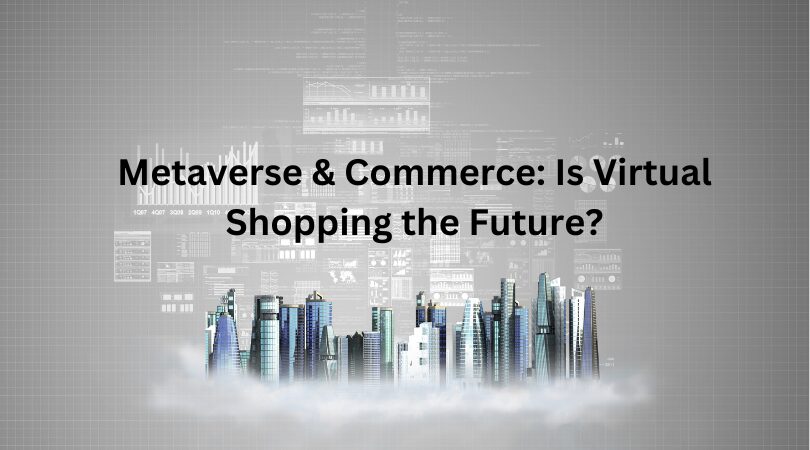Buying your favorite car, dress, watches or any accessories from your favorite brand, renting an apartment or even borrowing money requires you to be at the location. Upon making payment, you might even try on some of these accessories to be sure they fit well on your skin. But imagine a world where you can shop, pick up your items, make purchases, all at the comfort of your home. This how Metaverse is trying to change the way commerce operates.
This virtual reality (VR) and augmented reality (AR) technology is providing people with an ecosystem where they can interact, shop, socialize and have great experiences at their comfort.
But the question is that: Is metaverse the future of commerce, or is it just an experience that will fade away with time?
What is Metaverse in Commerce?
Metaverse and commerce are two different ideologies. The combination of these two is what is bringing about a revolution. Metaverse in commerce is about changing the way people go about buying their favorite brands, and how these brands can sell their products and further maintain a mutually beneficial relationship between brand and customer, customer to customer.
Imagine you want to buy a product and instead of clicking through images, you can access these products through virtual 3D stores, try out these products in virtual spaces or even get a Ai-powered avatar as an assistance to check desired products.
For businesses, this is a more improved way to interact with their customers, understand their preferences and ensure that products meet the ever-changing tastes of consumers.
The metaverse market size is valued at $86.71 Billion and expected to grew to 1112.04 Billion by 2023 with a growing CAGR of 39.68%.
How Emerging Commerce Companies are using Metaverse
Emerging markets are incorporating metaverse into their business operation to further improve their company reach, goals and revenue. These commerce companies ranges from lending and borrowing, to shopping. Some of these companies include but not limited to the following:
- Spatial Labs
Spatial Labs is one of the leading high tech street wear companies that have incorporated metaverse into its business operations. In 2024, the company made public its intention to produce high tech wear that connects to the technology.
The company, Spatial Lab’s Core Collection, features a futuristic streetwear that allows users to scan clothes where they are invited to new curated digital social platforms called circle which can only be accessible with contact with the apparel.
- Mahindra & Mahindra
If you are a car enthusiast, you might want to consider this company. In 2023, this company created a virtual reality experience for car lovers, by introducing the XUV400verse. This verse allows users to interact in a virtual brand showroom, showcasing virtual car test drives.
Similarly, top companies like Toyata and Hyundai have also incorporated this idea into car manufacturing, improving user drive experience and their interaction with cars they love. For example, in 2024, Amazon launched a virtual car dealership with Hyundai in 48 cities across United States
- Roblox
To improve commerce, companies like Roblox are rolling out virtual shops that can be rented and used to display products. This idea is to eliminate the traditional selling system that requires the four walls of a shop and traditional marketing system of products.
Founded in 2004 by David Baszucki and Erik Cassel, the platform has also incorporated the use of AI to improve customer experience for shoppers on the platform.
How Startup can Leverage Metaverse for Commerce
The metaverse presents a truly game changing opportunity for new startups, especially businesses here in the US to really get creative and broaden their commercial activities. By making use of immersive tech startups, let’s use the language of play, they can bring to market exciting new experiences that will engage your customers in unique and new ways.
- Establishing Virtual Storefronts
Startups can design virtual stores that are 3D within the metaverse. This will allow customers to interact and explore products inside this environment that can simulate an in depth shopping experience.
This approach enhances the feeling of the web shopping experience by making it more engaging and presence feels real not virtual. Thanks to artificial intelligence, such as those made by Roblox and others that companies use to create virtual stores and sell merchandise within them. Startup companies can leverage this to make extra income.
- Hosting Virtual Events and Product launches
The Metaverse gives startups a place to host events to launch products and exhibitions and workshops with no regard for location. Events can replicate the energy and engagement of physical gatherings and give opportunities for face-to-face mingling with audience members.
We can even see this happening with something like Valentino Beauty. They have produced a pop up that features a mirror that allows customers to try on digital makeup directly. This combines an actual brick and mortar shopping experience with technology.
- Using Virtual Collaboration spaces
Startups can use the exciting metaverse to create virtual spaces for collaboration that let people work and team up across different parts of the world. By making a world so interactive, face to face interaction feels more frequent and easy.
Because of this, startups can boost both productivity and innovation by imitating close working that exists in the real world as closely as possible.
Conclusion
The metaverse is no longer just some far away thing, it’s right here and it is shaping how businesses interact with people, sell things and build community. Startups stepping boldly into this digital revolution will lead and they will in fact remake the future of commerce.
From virtual storefronts and immersive shopping sensations to digital twins and engaging games as marketing tools, opportunities are enormous. The critical thing is to start immediately—try things out, innovate and find integration ways into your business model ahead of your rivals.
The question isn’t whether businesses should enter the metaverse anymore—it is a matter of how fast, what pace they’ll move with.






